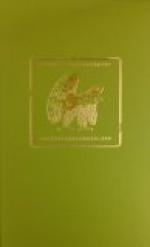With this he hurried by her to the office. Presently the freight whistled the siding, and Bailey picked up the baggage and went down to make arrangements with the trainmen. The girl followed, and when Tisdale came back, she stood framed in the doorway of the waiting caboose, while a brakeman dusted a chair, which he placed adroitly facing outside, so that she might forget the unmade bunks and greasy stove. “It isn’t much on accommodations,” he said conciliatingly, “but you can have it all to yourselves; as far as you go, it’s your private car.”
The other train thundered into the station and past; the freight began to move, and Tisdale swung himself aboard. Then the station master, remembering the apples at the last moment, ran with the basket, crowned still by the Rome Beauty for which he had refused five dollars, and dropped it as a parting tribute at her feet.
“Thank you! Thank you for everything!” Her soft voice fluted back to Bailey, and she leaned forward a little, raising her hand with a parting salute. “Good-by!”
Then, as she settled back in her chair, her swift side-glance swept Tisdale. It was incredible he had removed so much dust in that brief interval, but plainly, somewhere in that miserable station, he had found water and towels; he had not seemed more fit that morning in the observation car. The hand he laid on the wall as a brace against the rocking of the light caboose was on a level with her eyes, and they rested there. It was a strong, well-made hand, the hand of the capable draughtsman, sensitive yet controlled, and scrupulously cared for. “I hope I pass muster,” he said, and the amusement played gently in his face, “for I am going to venture to introduce myself. Possibly you have heard Judge Feversham speak of me. I am Hollis Tisdale—Miss Armitage.”
In the instant he hesitated on the name, she gave him another swift upward glance, and he caught a question in her eyes; then the sparkles rose, and she looked off again to the point where the railroad track was lost among the dunes. “Of course I have heard of you,” she admitted. “We—Mrs. Feversham—recognized you this morning in Snoqualmie Pass and would have spoken to thank you for your service had you not hurried aboard your train. She has known you by sight and has wished to meet you personally a long time. But I—I—as you must know—I—”
She had turned once more to give him the direct look of her unveiled eyes, and meeting his her voice failed. The color flamed and went in her face; then, her glance falling to the basket at her feet, she bent and took the largest apple. “Did you ever see such a marvel?” she asked. “It came from that station master’s orchard in the Wenatchee valley. He called it a Rome Beauty. Divide it, please; let us see if the flavor is all it promises.”




